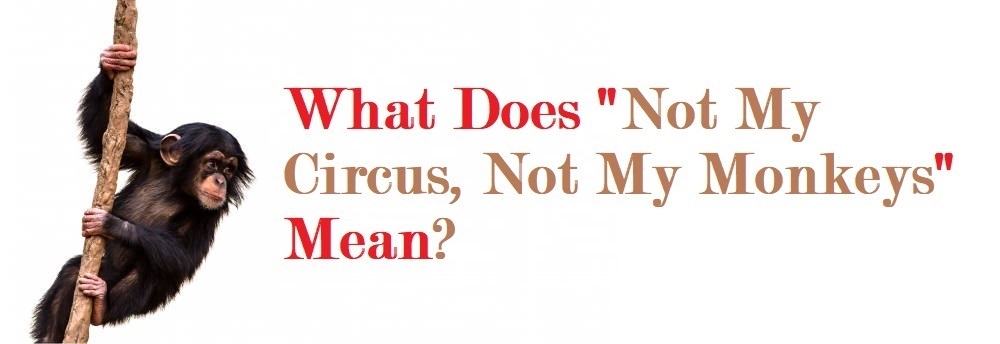Not My Circus, Not My Monkeys
The phrase “Not My Circus, Not My Monkeys” is a timeless reminder to stay grounded and avoid getting entangled in unnecessary chaos. With its origins in Polish culture, this clever saying has transcended borders to become a universal mantra for setting boundaries and focusing on what truly matters. Its imagery of a chaotic circus and unruly monkeys serves as a powerful metaphor for situations beyond our control. Whether applied to personal relationships, workplaces, or larger societal challenges, it offers valuable insight into maintaining balance and clarity in a chaotic world. Embracing this mindset can help reduce stress and allow for a more focused, purposeful life.
Origin of “Not My Circus, Not My Monkeys”
The saying comes from the Polish proverb “Nie mój cyrk, nie moje małpy,” which translates literally to “Not my circus, not my monkey.” Over the years, this phrase transitioned from a uniquely Polish expression into a universal mantra for setting boundaries and letting go of chaos that isn’t yours to manage.
Originally, the Polish version may have referred to a single monkey, but the plural form in English captures the broader imagery of mismanaged chaos, such as a poorly run circus. It serves as a perfect metaphor for situations filled with drama, confusion, and players (the “monkeys”) outside of one’s responsibility.
In Which Country Does the Phrase Mean ‘Not My Problem’?
While the phrase has its roots in Polish culture, its message resonates worldwide. It has become particularly popular in English-speaking nations where people often need to set boundaries in the face of external pressures. Whether in Poland, the U.S., or elsewhere, the phrase universally means, “This isn’t my issue to fix or control.”
Its growing usage across various cultural and professional settings highlights how the wisdom of detachment is appreciated in an increasingly interconnected yet chaotic world.
What Does “Not My Circus, Not My Monkeys” Mean?
At its heart, the phrase encourages clarity and focus. It emphasizes detachment from problems or responsibilities that don’t belong to you. The “circus” symbolizes chaos or a problematic situation, while the “monkeys” represent the people, issues, or distractions involved.
Using this phrase reflects:
- Recognizing boundaries: Knowing when something isn’t your responsibility.
- Letting go of control: Accepting that you can’t manage or fix everything.
- Avoiding unnecessary stress: Prioritizing what truly matters in your life.

Whether applied to work, family, or society, it’s a reminder to conserve your energy for situations within your sphere of influence.
Practical Uses in Everyday Life
This phrase serves as a valuable tool for managing stress and setting boundaries in various aspects of daily life. Whether you’re dealing with personal relationships, work dynamics, or societal issues, it helps you navigate situations without becoming overwhelmed or involved in matters outside your control.
In the Workplace
Offices often come with drama, conflicts, or tasks that don’t involve you. For example, when two colleagues argue over a project you’re not part of, the phrase reminds you not to intervene unnecessarily. Instead, focus on your own responsibilities to maintain productivity and reduce stress.
Within Families
Family dynamics can be complex, with frequent disagreements or unresolved tensions. If an argument arises between relatives, remembering “Not My Circus, Not My Monkeys” helps you stay neutral and avoid being dragged into conflicts you cannot resolve.
Among Friends
Friend groups sometimes come with emotional baggage or overreliance. For instance, if a friend tries to involve you in personal disputes, politely stepping back with this mindset can maintain the balance between care and over commitment.
Political or Societal Issues
In the face of large-scale events like elections or societal debates, it’s easy to feel overwhelmed by factors beyond your control. This phrase encourages focusing on meaningful action—voting, volunteering, or self-education—rather than dwelling on the uncontrollable.
Why are Boundaries Important?
The saying reflects the deeper concept of boundaries, which are vital for healthy relationships and mental well-being.
Protecting Mental Health
Constantly taking on others’ problems can lead to burnout. Setting limits protects your emotional resources and ensures you have the energy for your priorities.

Encouraging Accountability
When you refuse to manage someone else’s “circus,” you empower them to handle their own challenges. This fosters growth and self-reliance in others.
Enhancing Work-Life Balance
Clear boundaries help separate work responsibilities from personal life, preventing feelings of overwhelm and increasing productivity in both spheres.
Strengthening Relationships
By avoiding over-involvement, you prevent resentment and maintain healthier, more respectful interactions.
Is it Rude to Say “Not My Circus, Not My Monkeys”?
The phrase “Not My Circus, Not My Monkeys” can be perceived as rude depending on the tone and context in which it is used. If said bluntly or dismissively, it may come off as cold or uncaring. In sensitive situations, such as a friend’s personal crisis, using this phrase might seem unsympathetic. However, if you want to convey the same message more tactfully, consider alternatives like: “I trust you to handle this,” “I’m not the best person to help with this,” or “This seems like something you’re better equipped to manage.” These alternatives offer a more considerate way to set boundaries without sounding dismissive.
Balancing Detachment with Empathy
While detachment is necessary for mental well-being, complete disengagement may lead to apathy. Here’s how to strike a balance:

- Assess Your Role: Determine whether you’re genuinely responsible for a situation.
- Offer Support Without Overstepping: Help when appropriate, but avoid taking control.
- Know When to Act: Some issues require stepping in, especially if they involve loved ones or ethical responsibilities.
Why has this Phrase Become So Popular?
The popularity of “Not My Circus, Not My Monkeys” stems from its relatability. In a world filled with distractions and high expectations, many people struggle to maintain focus on their priorities. This phrase offers a humorous yet profound way to let go of unnecessary burdens and reclaim peace of mind.
Moreover, its imagery—a chaotic circus filled with unruly monkeys—is memorable and captures the essence of chaotic situations that are best left alone.
Conclusion
“Not My Circus, Not My Monkeys” is more than a clever phrase; it’s a philosophy for mindful living. Its origins in Polish culture add richness to its universal appeal, while its practical applications in personal and professional life emphasize the importance of boundaries.
By embracing this mindset, you can focus on what matters, reduce unnecessary stress, and foster healthier relationships. Use it wisely, and remember: your energy is best spent on your own circus—and your own monkeys.